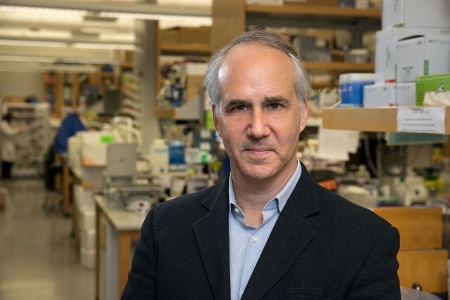
Principal Investigator
Gordon and Virginia Macdonald Distinguished Professor
Senior Associate Dean and Associate Vice Chancellor of Precision Health in the UCLA Health System and David Geffen School of Medicine
Director, UCLA Center for Autism Research and Treatment (CART)
2506 Gonda 695 Charles E. Young Dr. South Los Angeles CA 90095-1761
p: 310 794-6570
f: 310 267-2401
dhg@mednet.ucla.edu
Dr. Dan Geschwind is the Gordon and Virginia MacDonald Distinguished Professor of Human Genetics, Neurology and Psychiatry at UCLA, where he leads the Geschwind lab. The arching goal of his work is to develop a more mechanistic understanding of neurodevelopmental and neurodegenerative diseases by integrative analyses that connect human genetic variation to genes and neurobiological pathways. The laboratory combines genetic, genomic and bio-informatic approaches with basic neurobiological investigation in model systems and human brain. The hope is that by understanding disease mechanisms we can develop more rationale and effective therapeutics for brain disorders. Dan obtained an A.B. in chemistry modified with psychology at Dartmouth College in 1982, followed by 2 years as a research associate at the Boston Consulting Group. He subsequently obtained his M.D. Ph.D (neurobiology with Susan Hockfield) at Yale School of Medicine (1991) prior to completing his internship, residency (Neurology), and postdoctoral fellowship at UCLA, after which he joined the faculty, founding the neurogenetics program within the department of Neurology in 1997. Soon after that, he co-founded and the UCLA Center for Autism Research and Treatment in the Semel Institute (https://www.semel.ucla.edu/autism), which he continues to lead. He was appointed as Senior Associate Dean and Associate Vice Chancellor of Precision Health, for his leadership of the Institute for Precision Health (IPH; https://www.uclahealth.org/precision-health/default.cfm ) at UCLA, where he oversees campus precision health initiatives. Dan has won several awards for his work and is a member of the National Academy of Medicine. The Geschwind laboratory pioneered the application of systems biology methods in neurologic and psychiatric disease, with a focus on autism spectrum disorders (ASD) and neurodegenerative conditions. The laboratory showed that gene co-expression has a reproducible network structure that can be used to understand neurobiological mechanisms in health and disease, and led the first studies to define the molecular pathology of autism and several other major psychiatric disorders. We demonstrated the utility of using gene network approaches to discover new pathways involved in neurodegeneration and new approaches to facilitate neural regeneration. Recognizing the importance of tissue specific gene regulation in disease susceptibility, the laboratory has developed several resources focusing on genetic and epigenetic regulation during human brain development to inform interpretation of genetic variation associated with neuropsychiatric and neurodevelopment disorders. We also have made significant contributions to defining the genetic basis of autism, starting with the development (in collaboration with the Cure Autism Now Foundation) of the Autism Genetic Resource Exchange an open shared resource for autism genetic studies, now a program of Autism Speaks (https://www.sciencedirect.com/science/article/pii/S0896627310008330?via%3Dihub). We continue to advocate for genetic and genomic data sharing and have continued our work in Autism Genetics to increase representation of more diverse populations in autism research in the form of the Autism Genetics and Human Diversity Program. Dr. Geschwind has trained over 90 graduate students and post-doctoral research fellows, and is committed to mentoring students and fellows from diverse backgrounds in the laboratory.